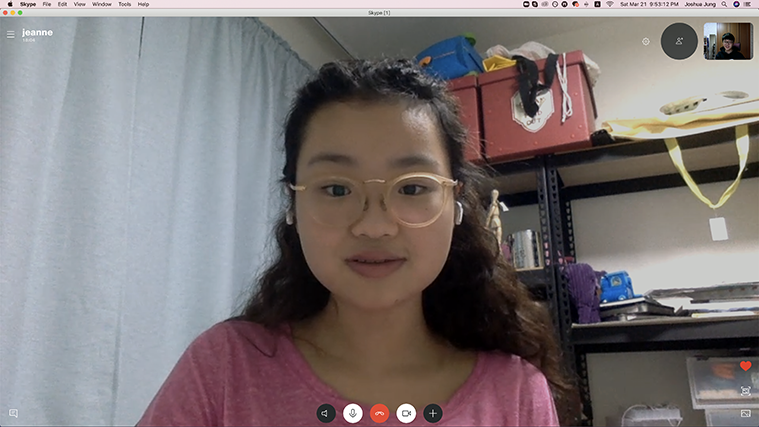Ever since the COVID-19 breakout, nations all around the world have taken action to ensure the safety of their citizens. International safety precautions include self-quarantining, and according to the New York Times, “[a]t least 93 percent of the global population now lives in countries with coronavirus-related travel restrictions.” Consequently, schools around the world have shut down and transitioned to online classrooms. The abruptness of this situation has caused much chaos for the 1.7 billion (UNESCO) - and increasing - students whose learning has become impaired. Eric Kim, a sophomore at Korea International School, is one among many students who were initially opposed to online schooling, as he thought it “[lacked] the interpersonal interaction that real schools allow.” Kim also thought that “the screen time causes a drop in focus and increases distractions.”
Due to the nature of this situation, students may see schooling online as an inconvenience, for it seems like an unorthodox method of education. Although the abruptness of this situation poses challenges for many quarantined students such as Kim, some others are academically unaffected by the quarantine: students who have been doing distance learning long before the pandemic, through full time online schooling. Online schooling is defined simply as “school at home via the internet,” according to Dr. Richard Krejcir from Methodschools, an independent, kindergarten to twelfth grade study charter. On the surface, online schools may appear less established or legitimate than brick and mortar schools (B&M schools), as online education is relatively uncommon and an unfamiliar concept to the general public. Moreover, online schoolers may be perceived as isolated, lonely, or introverted. However, there are enough advantages to online schooling that make it a viable and appealing education option for many, and should be taken into consideration as the next potential schooling option going forward even after this pandemic.
Of course, not every online school is legitimate, but in the realm of online education, quality schools do exist, so this schooling option should not be put down. According to Niche, a popular school ranking site, the number one ranked online school in America, Stanford Online High School (SOHS), is also ranked fourth for “Best High Schools for STEM in America” and 7th for “Best Private High Schools in America.” These rankings suggest that online schools can provide highly effective and rich educational experiences. Because SOHS holds A+ ratings across all Niche evaluations and holds a 100% graduation rate, I interviewed some of its students to find out how these scores are reflected in reality, as well as to learn more about their overall educational experiences. Their comments about school life were not only positive, but also revealed the advantages that online schools offer over brick and mortar schools.

One may wonder what could possibly compel students to apply to an online school, like Stanford Online High School. For Henri Machado, an SOHS sophomore living in Portugal, the curriculum at his B&M school simply lacked the academic rigor that he was seeking. He was looking for a challenge, and that's exactly what he found at SOHS. Machado realized he “could do as much as [he] wanted,” due to the school’s fully customizable curriculum. Since he was a child, Machado had a passion for mathematics, and he is currently taking Multivariable Calculus as a sophomore, which most high schools do not even offer. In addition to being able to foster his interests in math, Machado appreciates SOHS for two main reasons.
First, he appreciates his current courses because his “[old] classes just aren’t equal to this, because there’s much discussion and in-depth thinking now.” In unconventional core courses, such as the 10th grade core course “History and Philosophy of Science,” students participate in regular discussion due to the seminar style of SOHS classes. For example, students may research a topic to present to the class, and lead the discussion on the topic afterwards. This trains students to present their ideas in an organized manner, and build off of others’ ideas to facilitate a productive conversation. Secondly, he values how 64 percent of SOHS’ instructors hold a PhD, and finds assurance in the credibility of his instructors’ teaching.

Academic rigor is not the only benefit of attending SOHS. Jeanne Choi, an SOHS freshman living in South Korea, particularly enjoys how she has seemed to gain independence as a result of taking initiative to find opportunities amidst remote learning, whether it be curricular or extracurricular. In addition to having courses “tailored to what we enjoy,” Choi believes the school’s “structure makes [students] responsible because [students] can’t fall behind.” As SOHS’ unique courses are designed with “high expectations,” Choi believes that she and her peers have learned to take initiative to “directly talk with [their] teachers during off hours,” and to actively seek help from one another in study groups.
Online schooling inevitably poses some challenges. One major concern online schoolers face is how to stay active in their local communities. Ironically, though, overcoming this challenge presents unique opportunities for personal growth for these students, such as the development of self-motivation and leadership qualities. Choi believes that due to her schooling status, “having to make your own extracurriculars helps [us] build better habits for [our] futures.” In Choi’s case, she participates in Taekwondo every day to work out and uploads her artwork across social media platforms to connect with others in her community. Through a flexible daytime schedule, online schools challenge students to practice responsibility and efficient time management.
Aside from SOHS, the realm of online schooling has various quality schools, such as GW University Online High School. GWUOHS offers unique course selections, including synchronous and asynchronous videos, assessments, and readings. Upperclassmen are offered to put a focus in their interests, including the option to attend entrepreneurship programs, which are not common in regular high schools. Online schooling does not only exist for high schoolers. Minerva Schools at KGI is an online university that is more selective than Harvard University, at a two percent acceptance rate. A unique aspect of Minerva Schools is that it provides residence halls all over the globe for students to reside at, where co-curricular and extracurricular activities are held. According to the founding Dean of Minerva Schools, Stephen Kosslyn, such communities “[are] at the heart of many aspects of college life,” thus cooperative opportunities are essential near students’ locations. Like SOHS, Minerva offers irregular yet meaningful courses that have a focus on offering practical benefits to students for their futures. For example, Minerva offers students international internship opportunities at Amazon, Amnesty International, Google, and many more.
Ever since the outbreak of COVID-19, millions of schools have temporarily transitioned to online learning. This unprecedented move has been met with mixed feelings, and online schooling is completely new to many. However, online schoolers at pre-existing, dedicated online schools are still observing regular school lives where personally tailored curriculums and opportunities for responsibility are prevalent. And yet, online schools are not fit for everyone, for not everyone is up for its expected independence, and many might thrive in a more structured B&M school. Moreover, the thought of permanent distance learning is not attractive for many students. Nevertheless, to some, online schooling allows for their unique needs to be met. It also allows students to obtain qualities that are not gained as frequently in B&M schools such as being independent and practicing responsibility. Before the pandemic, the concept of online schooling was foriegn to many. However, now that online schooling is rapidly becoming an unavoidable method of education, we may wait and see whether this schooling option will become openly accepted in the future, or recede back to its underrated, unpopular status.

Joshua Jung
Sophomore (Grade 10)
Korea International School & Stanford Online High School

